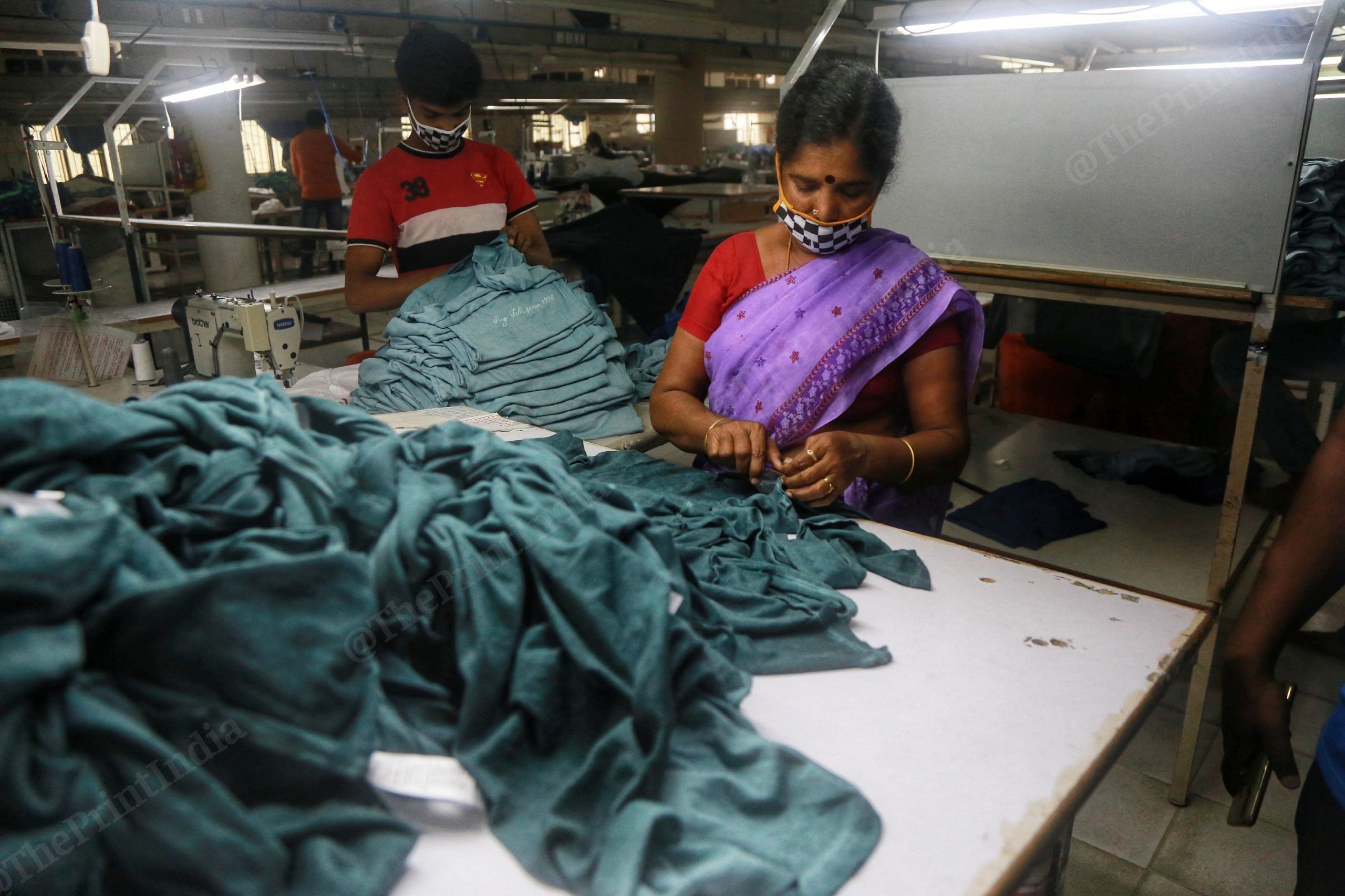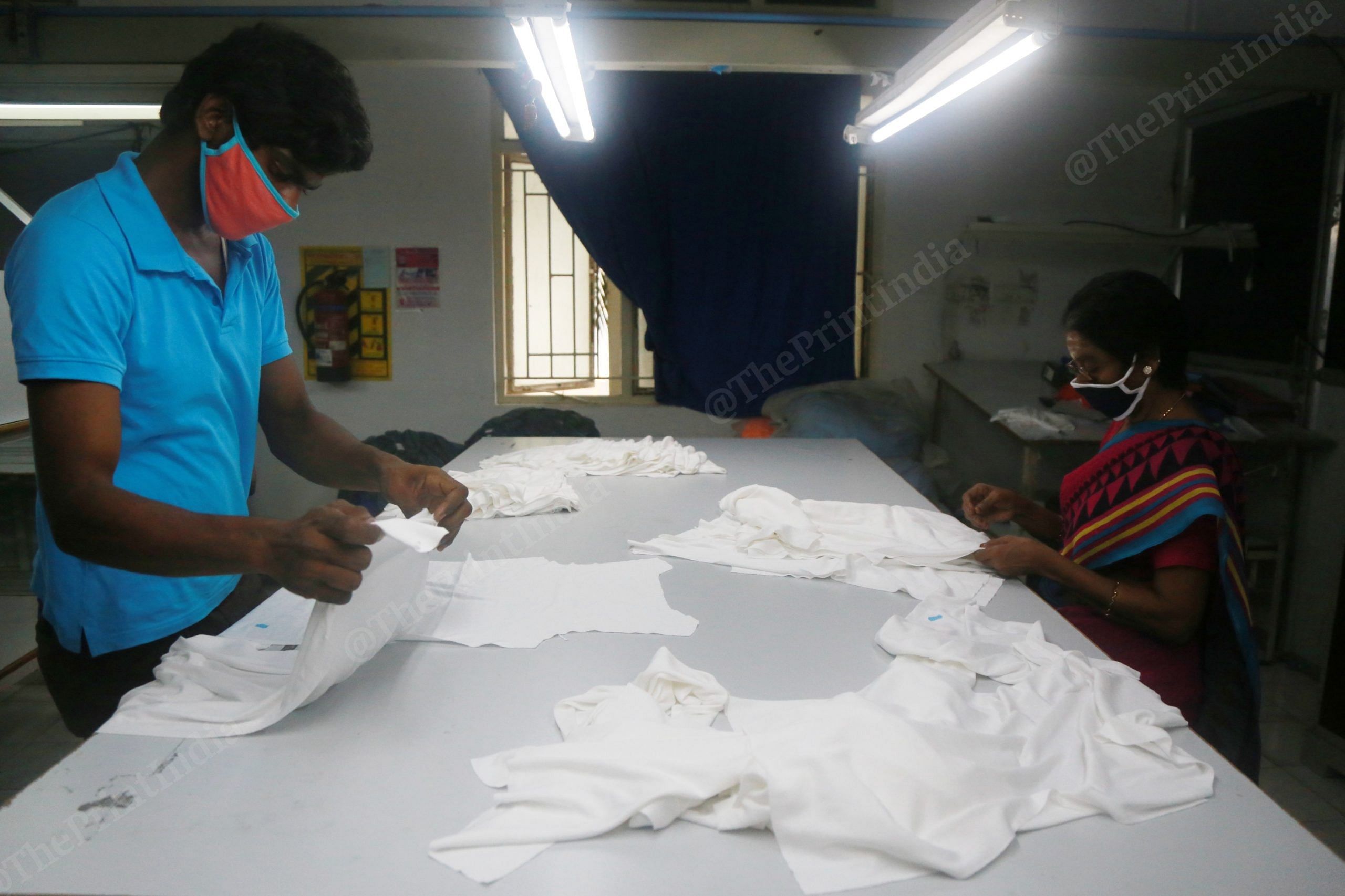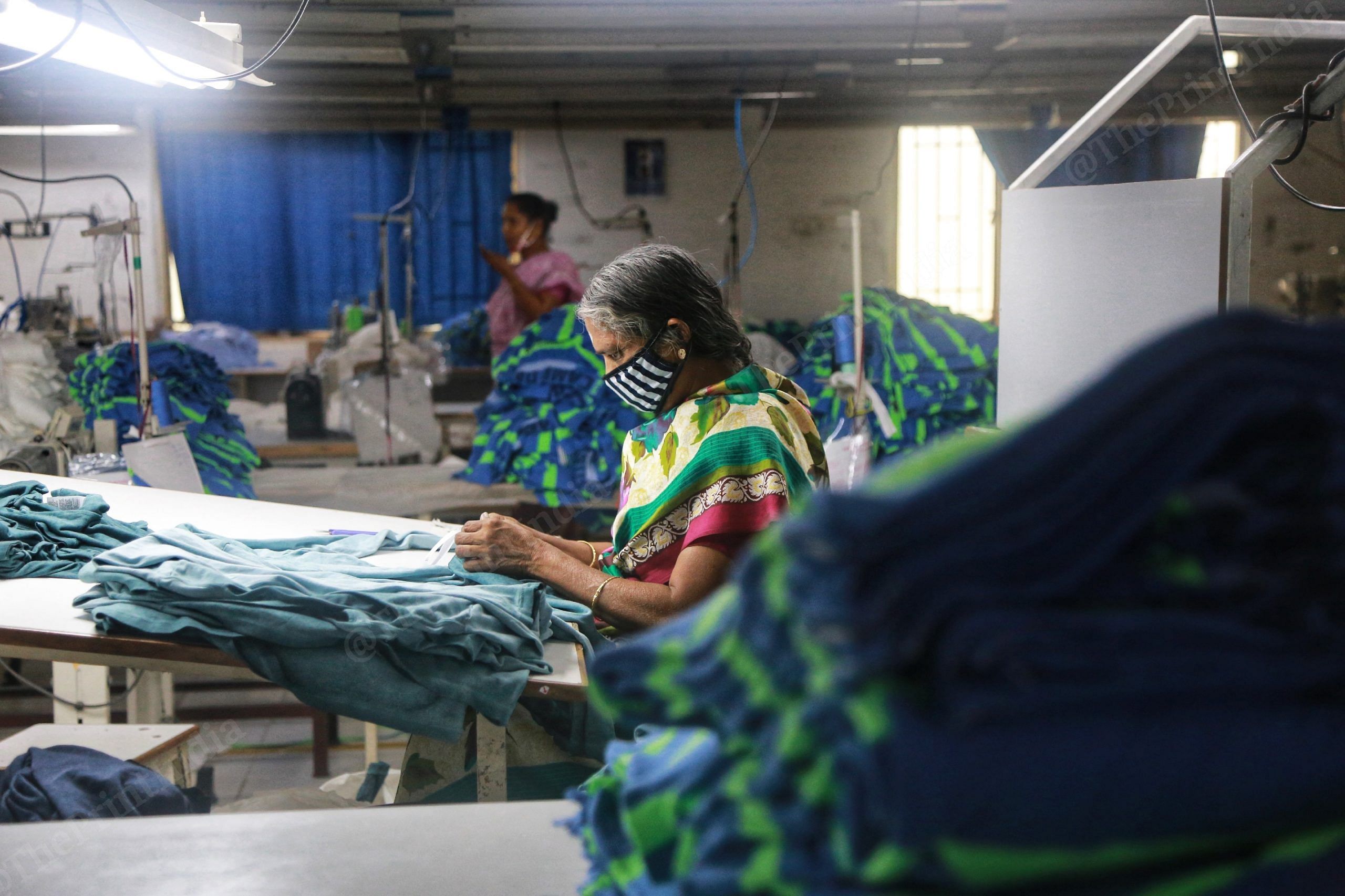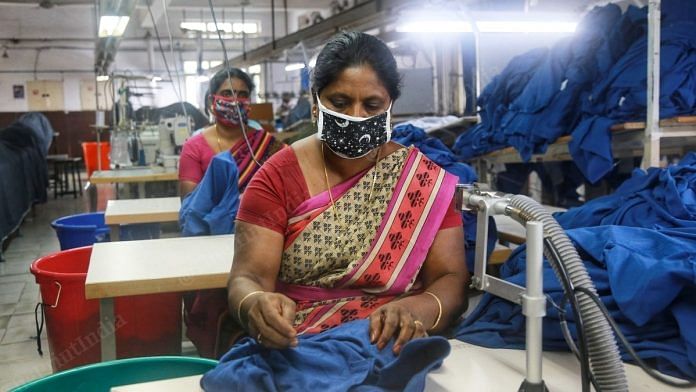Tiruppur: Nearly six months after the Covid-19 outbreak first impacted the garment industry in Tiruppur, the ‘knitwear capital of India’ has now resumed operations, catering to export orders from several parts of the world.
Speaking to ThePrint, Tiruppur Exporters’ Association president Raja M. Shanmugham said the Covid-19 pandemic and the subsequent lockdown dealt a huge blow to the industry, but workers are back in factories now.
“The positive sign is that June, July and August are usually considered the lean season and we are already getting orders. For the past three weeks, since the factories resumed production, exports to countries such as the US, Australia and all of the European Union have begun,” he said.
The Narendra Modi government’s decision to provide a 20 per cent working capital liquidity and six-month loan moratorium aided the Tamil Nadu hub, which has an annual turnover of around Rs 52,000 crore in exports and domestic sales, he said.
The pandemic and the rising anti-China sentiment across the world could also propel the industry and provide it an opportunity to take business away from the Asian giant, which is the world’s leading textiles manufacturer.
As of now, the industry’s immediate focus is on restoring normalcy in the city that hasn’t recorded any new Covid-19 cases since 2 May, with all the 114 reported cases having been discharged.
Also read: Indian economy to shrink by 3.2% in fiscal year 2020-21: World Bank
Early impact of Covid-19
The garment hub in Tiruppur — which is 450 km from Chennai with a population of 25 lakh — accounts for 90 per cent of India’s cotton knitwear exports.
It largely produces t-shirts, among other items like trousers and jeans, and exports it to the US, Australia and countries in Europe. Some of its major global clients include Zara, GAP, Marco Polo, Tommy Hilfiger, H&M and Puma.
When the Covid-19 outbreak impacted China in January and travel restrictions were brought in place, the hub was hit early. Then the sudden closure of exports and the market in mid-March as the Western world shut down only sent the industry in disarray.

The nationwide lockdown in India, enforced on 25 March, brought it to an abrupt standstill.
District Collector Vijayakarthikeyan K. told ThePrint that he met all garment factory owners a week before the lockdown and decided to shut down all factories as it was “better to be safe than sorry”.
“Since the beginning of January, the garment industry in Tiruppur has faced losses of almost Rs 9,000 crore,” Shanmugham said, adding that old clothes could not be exported as the markets in Europe and US function on a season-by season basis.
During the peak season — March to May — the industry would have exported goods worth up to Rs 2,700 crore monthly in a normal scenario, said Shanmugham, who owns garment-maker Warsaw International.
As the economy started reopening in phases from April, the factories got back to work with 30 per cent staff initially, then 50 per cent and nearly full now.
Also read: Chennai’s fisherfolk set for business, while Telangana’s brick workers vow never to return
Manufacturing PPEs – how industry kept afloat during lockdown
Tiruppur has 1,500 companies which are directly involved in exports, while it also has 10,000 ancillary units. Many of these factories were shut during the lockdown. But some remained open as they were directly involved in manufacturing personal protective equipment (PPE) kits as India ramped up its domestic production to fight Covid-19.
SCM Garments, which is among the top five exporters in Tiruppur, manufactured over 5 lakh PPE kits during the lockdown, said the company’s marketing head Ashok. “Not only did we produce PPE kits but we also manufactured isolation gowns and masks, which was given to the Tamil Nadu government and the Kerala government,” he said.
The production of the safety material began 15 days after the lockdown and helped keep the company’s workforce intact.
Vijayakarthikeyan said PPE kits and equipment such as isolation gowns, goggles, masks were sent to not just Tamil Nadu and Kerala but Telangana and other states as well. He said it accounted for approximately 45 per cent of what the factories would have earned in non-Covid scenario, and helped keep the systems running.
It started as a humanitarian effort, but later came to be seen from a business lens, said Shanmugham, adding that PPE manufacture helped monetarily but also opened the industry’s eyes to the significant strides in the technical textile arena. It also involved approximately 10 per cent of the labour force.
Also read: Chinese sanitiser dispenser — big hurdle in India’s path to self-reliance in Covid battle
What the industry did amid migrant crisis
The garment industry in Tiruppur employs up to 6 lakh people, out of which 2 -2.5 lakh are migrant workers. People come to work here from all 29 states of the country, said Vijayakarthikeyan.
“Everyone who touched this ground would breathe a free atmosphere and be relieved from clutches of all social stigmas they were earlier living with,” Shanmugham said.
When the lockdown was enforced, like most other parts of the country, Tiruppur also saw the exodus of migrants. While some were stranded at their homes as they had left for Holi a few weeks in March and could not return, some others left for their homes shortly after the lockdown.

This was detrimental to both the industry as well as the workers, said Shanmugham even as he expressed confidence that everybody would soon return.
Vijayakarthikeyan said he didn’t know of any layoffs or pay cuts in the industry.
Shanmugham said those who returned could no longer be paid, adding that factories took care of food and dry rations during the lockdown but couldn’t provide wages. He said the Employees’ State Insurance (ESI) should take care of the well-being of labourers as all factories pay Rs 100-150 crore annually to ESI as stipulated.
“ESI should take care of the workers but nobody is using it. They are keeping mum,” said Shanmugham.
Tara Bodo Bhadra, one of the workers in a factory who is from Kolkata and has been working in Tiruppur for six years said, “During the lockdown I didn’t try going home. We have not faced any problem here, the company we are working for gave each of us Rs 700 during the lockdown and we got rations from the government so there was no problem.”
Vijayakarthikeyan added that the local administration was extending soft loans to infuse more cash into the system with a longer repayment time at lower interests. It also set up a Covid control room to address labourers’ grievances.
Shanmugham said the Tiruppur industry is unlike any other. “It is neither a PSU, nor is it an industrial cluster and nor is it run by a few families. The motto here is ‘today’s worker is tomorrow’ owner’. This cannot be replicated anywhere else,” he said. The collector also repeated this motto.
Also read: Modi, migrants and monsoon make rural India top consumer equity bet
Operations resume, edge over China
Shanmugham said operations were now resuming and factories were getting orders. While he labelled the Covid-19 lockdown as a “crippling” event, he is optimistic that the industry should reach normalcy in six months, if not earlier.
At the Netaji Apparel Park in Tiruppur, Sarojini, a worker at Kartar Fashions Pvt Ltd said she resumed work two weeks ago with all safety protocols in place.
“We have to wash our hands regularly, maintain distance while working and always keep a mask on,” she said. The factory even has markings on the floor to signify the distance at which people should stand from each other to maintain physical distancing.

Asked about whether the pandemic will leave a permanent impact on the industry, Shanmugham said it will bring in a “new normal”, where the hub will also be asked to manufacture masks in an additional business that couldn’t even be dreamt of earlier.
He said the pandemic might also create a global aversion to China and help India in increasing its exports. For that, however, India needs to get equipped and be prepared. “We lack preparedness at both the government and industrial level,” he said.
“In order to grab that opportunity we need to be prepared and reach that level. It is easy to say that China’s orders will flow into Tiruppur. However, the execution is difficult. We need to match the expectation. China has a massive production base and very strong commitment,” he said.
India’s biggest lacuna is that we don’t honour commitment that much and that our consistency and quality is relatively weaker, Shanmugham added.
Also read: Why the US can’t end China’s control of the global supply chain




What happen to ThePrint its covering south india and all these days, that too interior business hubs ,Good job though .